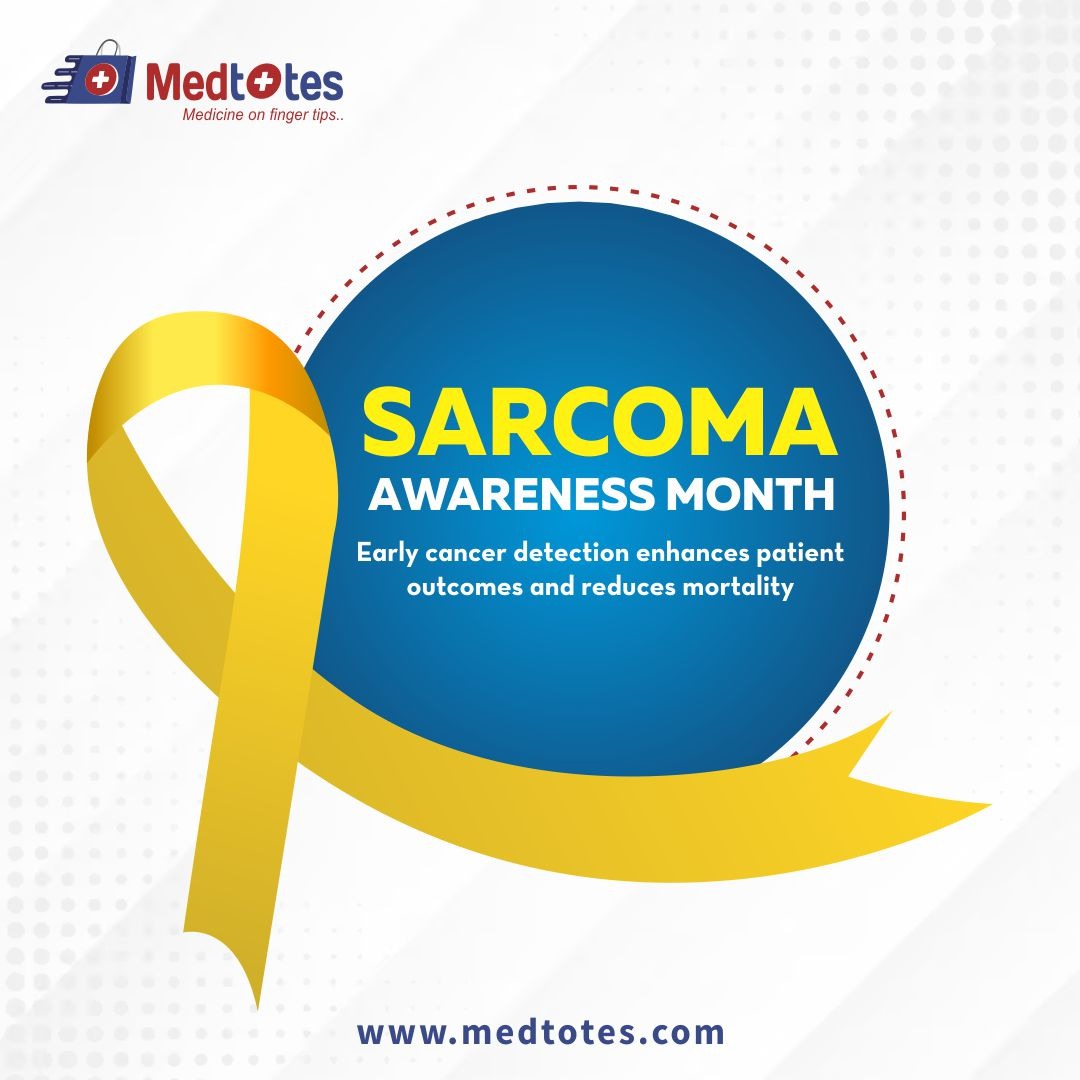Definition of Sarcoma : A sarcoma is a rare type of cancer that develops in the connective tissues of the body, such as bones, muscles, tendons, and cartilage. It is characterised by the abnormal growth of cells in these tissues, which can form tumours that may spread to other parts of the body. Sarcomas can occur in people of all ages, but they are more commonly diagnosed in children and young adults. The exact cause of sarcoma is unknown, but certain genetic factors and exposure to radiation or certain chemicals may increase the risk. Symptoms of sarcoma can vary depending on the location and size of the tumour, but they often include pain, swelling, and a noticeable lump or mass. Treatment options for sarcoma typically involve a combination of surgery, radiation therapy, and chemotherapy. Early detection and prompt treatment are crucial for improving outcomes in patients with sarcoma. Research efforts continue to explore new therapies and advancements in understanding this complex disease.
Importance of raising awareness: The importance of raising awareness about sarcoma cannot be overstated. Sarcoma is a rare form of cancer that originates in the bones, muscles, or soft tissues of the body. Due to its rarity, it often goes undiagnosed or misdiagnosed, leading to delayed treatment and poorer outcomes for patients. By raising awareness about sarcoma, we can help educate the public and healthcare professionals about its signs and symptoms, leading to earlier detection and intervention. Moreover, increased awareness can also facilitate research efforts and funding for better treatment options and improved patient care. Additionally, raising awareness can help reduce the stigma surrounding sarcoma and provide support networks for patients and their families who may feel isolated in their journey. By joining forces to spread knowledge about sarcoma, we can make a significant impact on early detection rates and treatment outcomes, ultimately saving lives. It is crucial that we continue to advocate for increased awareness of sarcoma to ensure that no one suffers needlessly from this devastating disease.
Signs and Symptoms
include a variety of indicators that can help in its identification. One common sign is the presence of a lump or mass that may be felt under the skin or in deeper tissues. This lump can be painless or may cause discomfort, depending on its location and size. Additionally, sarcoma cancer can manifest as unexplained weight loss, fatigue, and weakness as the body’s energy is redirected to fight the disease. Other symptoms may include persistent pain in the affected area, a limited range of motion, and swelling. In some cases, sarcoma cancer can also lead to bone fractures or neurological symptoms if it affects nearby nerves. It is important to note that these signs and symptoms may vary depending on the specific type and stage of sarcoma cancer. Therefore, it is crucial to consult with a healthcare professional for an accurate diagnosis and an appropriate treatment plan.
Diagnostic Methods
include a combination of imaging techniques, biopsy, and molecular testing. Imaging techniques such as magnetic resonance imaging (MRI), computed tomography (CT), and positron emission tomography (PET) scans are used to visualise the tumour and determine its size, location, and spread. These noninvasive methods provide valuable information for treatment planning. A biopsy is a crucial diagnostic tool that involves removing a small sample of tissue from the tumour for examination under a microscope. This allows pathologists to determine the type of sarcoma cancer present and its grade, or aggressiveness. Molecular testing plays an important role in identifying specific genetic mutations or alterations that may guide targeted therapies or provide prognostic information. By analysing the DNA or RNA of the tumour cells, molecular testing can help personalise treatment options for patients with sarcoma cancer. Overall, these diagnostic methods work together to provide a comprehensive understanding of the disease, enabling healthcare professionals to develop tailored treatment plans for individuals with sarcoma cancer.
Treatment Options
Sarcoma cancer treatment options include surgery, radiation therapy, and chemotherapy. Surgery is the primary treatment, removing the tumour and surrounding tissue to prevent cancer’s spread. Radiation therapy targets and kills cancer cells before or after surgery and can be used as a palliative treatment. Chemotherapy uses drugs to kill cancer cells throughout the body, often combined with surgery or radiation therapy. Targeted therapies and immunotherapy are emerging as promising treatments. Clinical trials are being conducted to explore new treatment approaches, such as gene therapy and personalised medicine, which offer hope for improved outcomes and a better quality of life for sarcoma cancer patients. These innovative approaches aim to target the underlying causes of cancer and potentially halt its progression.
Conclusion
In conclusion, sarcoma cancer is a complex and challenging disease that requires a comprehensive approach to treatment. Through advancements in medical research and technology, there is hope for improved outcomes and a better quality of life for patients diagnosed with this rare form of cancer. Early detection and accurate diagnosis play a crucial role in determining the most effective treatment options, which may include surgery, radiation therapy, chemotherapy, targeted therapies, or a combination of these approaches. Additionally, ongoing clinical trials and innovative therapies offer promising avenues for future advancements in the field. It is essential for healthcare professionals to collaborate closely with patients and their families to provide personalised care plans that address not only the physical aspects but also the emotional and psychological well-being of those affected by sarcoma cancer. By fostering a multidisciplinary approach that involves oncologists, surgeons, radiologists, pathologists, psychologists, and support groups, we can strive towards better outcomes and improved survival rates for individuals battling this challenging disease.
For More Information or Contact…!!!
𝗖𝗔𝗟𝗟: 040 35159159
WhatsApp: 7075490607
𝗩𝗶𝘀𝗶𝘁: https://www.medtotes.com/
Drop us an email at:- support@medtotes.com
Download app:
Android: https://bit.ly/3Q3gQw8
iOS: https://apple.co/3nknQIm

